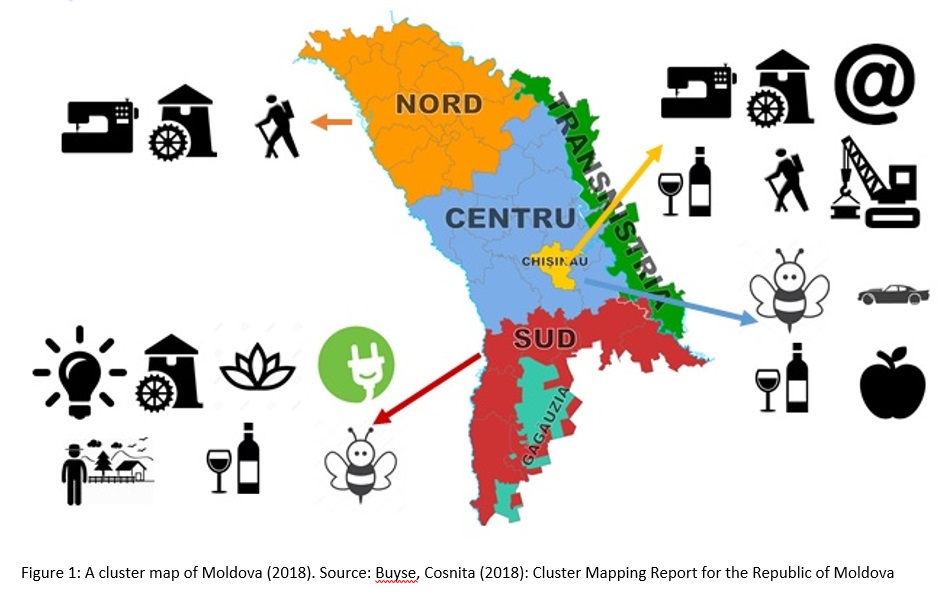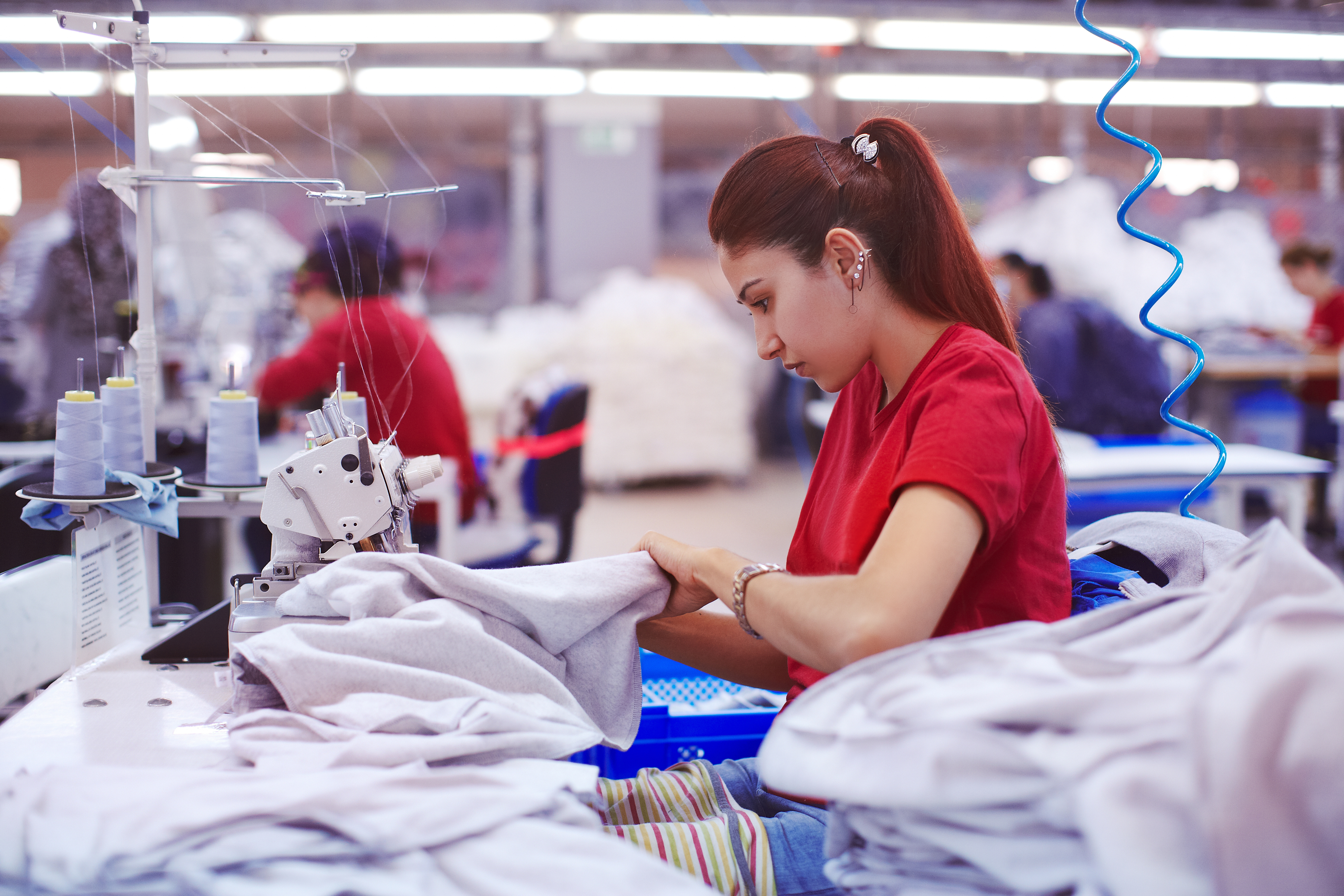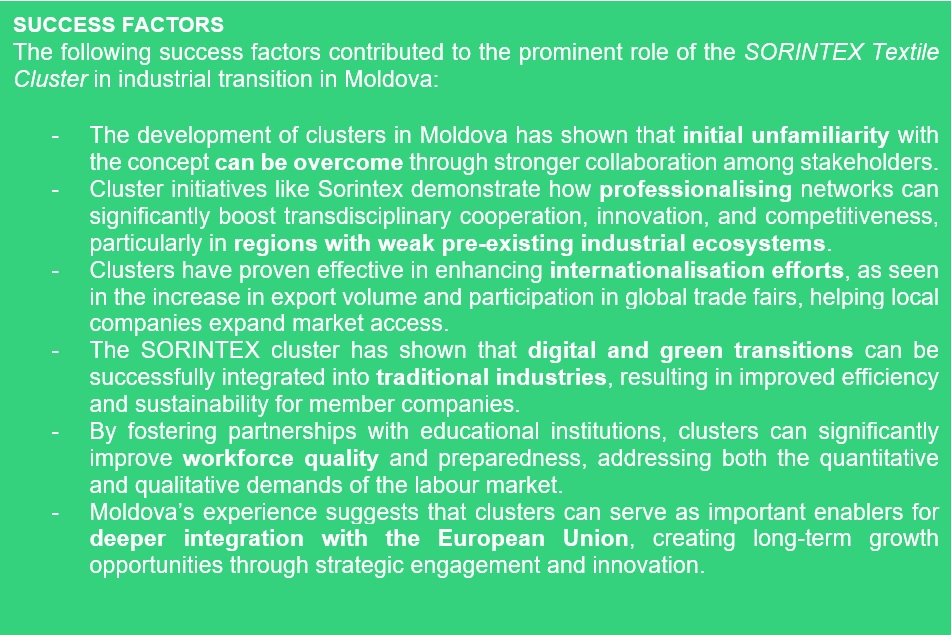Facilitating Industrial Transition in the Textile Industry
Summary: The SORINTEX Textile Cluster has emerged as a key actor in Moldova’s industrial ecosystem, particularly within the northern region. Launched in 2018, the cluster has played a pivotal role in driving Moldova’s industrial transformation by fostering collaboration among private companies, academia, and public administration. By focusing on innovation, sustainability, and internationalisation, SORINTEX has helped its members to improve productivity, increase exports, and adopt green and digital technologies. The cluster’s success has made it a role model for strenghtening Moldova’s economic resilience and advancing its integration into the European Union.
The Republic of Moldova

The Republic of Moldova, located in Eastern Europe, is strategically positioned between Romania to the west and Ukraine to the north, east, and south. Its geographic location not only makes Moldova a crucial transit point for trade between the European Union and the Commonwealth of Independent States (CIS) but also enhances its potential as a bridge between Eastern and Western Europe. Moldova has a population of approximately 2.4 million people and a GDP of around $16.5 billion. Despite its small size, Moldova hosts a diverse economy that includes agriculture, manufacturing, and a growing information technology sector. The country is home to several hundred companies, 16 state universities and 15 private institutions as well as a growing number of innovation hubs and tech start-ups.
According to the Global Innovation Index 2023, Moldova performs above expectations for its level of development, ranking higher than many of its peers in the lower-middle-income group. The country has shown significant progress in areas such as knowledge creation, innovation linkages, and ICT services exports. Moldova's improving innovation ecosystem is marked by increasing collaboration between academia and industry. The European Innovation Scoreboard (EIS) 2024, however, classifies Moldova among the “Emerging Innovators”. Despite a slight improvement since 2017, Moldova has the lowest score among 40 ranked countries, and the gap with the EU average continues to widen.
A more detailed assessment of Moldova's economic profile is available at the ECCP Input Paper 2024 on Moldova.
Moldova faces a number of significant strategic challenges, intensified by several crises in recent years. The country is grappling with the long-term effects of the COVID-19 pandemic, which have strained its health system, disrupted economic activities, and led to lasting social and economic consequences. Additionally, Moldova has faced an ongoing energy crisis for the past two years, which has created widespread insecurity and contributed to an economic downturn. The rising costs of energy have led to an increase in prices, further burdening the population and the economy.
Compounding these issues, Moldova is also dealing with war-related disruptions due to Russia's aggression against Ukraine. This conflict has destabilised the region, causing significant security concerns and disrupting trade routes that are vital for Moldova's economy. The geopolitical tensions have exacerbated the country's energy crisis, as Moldova is dependent on energy imports, including from Russia. Moreover, the war has severely undermined investor confidence, leading to a decline in foreign investments. The resulting economic uncertainty has made it more difficult for the government to implement necessary reforms and foster economic growth.[1]
To address these challenges, Moldova's strategic focus is guided by the National Development Strategy Moldova 2030[2], a multi-sectoral plan aimed at creating a sustainable and inclusive economy while ensuring a healthy environment. The primary goal of this strategy is to significantly improve the quality of life for all Moldovans. This involves not only reducing poverty in its various forms but also ensuring equitable access to essential public and private goods and services, thereby addressing the broader aspects of poverty beyond mere income levels. With 14.5% of the rural population living below the poverty line compared to 3.1% in urban areas, reducing poverty and economic inequality is a critical priority.
Key components of the Moldova 2030 strategy include:
- Sustainable and Inclusive Economy: This involves increasing revenue from sustainable sources, improving living conditions, expanding access to utilities such as safe water and sewerage, and enhancing working conditions to reduce informal employment. A particular emphasis is placed on stimulating productive employment and entrepreneurship, with a focus on supporting micro, small, and medium enterprises (MSMEs).
- Healthy Environment: Ensuring the right to a healthy environment is central to the strategy. This includes improving water and soil quality by reducing pollution, minimising the discharge of hazardous substances, and increasing the availability of renewable fresh water. The strategy also aims to reduce untreated wastewater discharge, thus enhancing environmental security and public health.
[1] For more information please see for instance at the websites of the world bank (https://www.worldbank.org/en/country/moldova/overview)
[2] Further information you can find on the S3 Platform (https://s3platform.jrc.ec.europa.eu/s3-for-sdgs-in-moldova)
Moldova’s path to economic recovery is closely linked to its relationship with the European Union. Plans to bring Moldova closer to the EU are seen as crucial for the country’s future stability and growth. In response to the economic crisis, there is an urgent need to develop key industries to ensure long-term economic resilience. Moldova's most developed sectors include furniture, textiles and wine production.
The IT sector in Moldova also offers significant opportunities for development. The establishment of numerous innovation centers, similar to clusters, has created a vibrant digital ecosystem. Initiatives such as the Digital Park[1] serve as central nodes in this ecosystem, fostering collaboration and innovation. Exploring the potential of IT clusters could further strengthen the country’s economic landscape.

The development of clusters in Moldova is relatively nascent but rapidly gaining momentum, particularly in sectors where the country already has a solid industrial base. Initially, the concept of clusters was unfamiliar to most stakeholders, and there was a general lack of understanding about what a cluster initiative is and what it could potentially achieve. This unfamiliarity made it difficult to foster collaboration, as the idea of working together in a structured, cooperative manner was not yet ingrained in the mindset of the actors involved. During the early stages of cluster development in 2018, the role as a regional driver was to act as a source of inspiration and guidance.
In order to analyse the regional cluster potential, a cluster mapping analysis was initiated by the Organization for Small and Medium Enterprise Sector Development (ODIMM) and conducted at the regional level in Moldova, covering the North (Soroca), Centre (Nisiporeni), South (Cahul), and Chisinau regions.[1] Workshops, attended by industry, academia, policymakers, and catalyst institutions, focused on mapping relevant economic sectors, including a peer review process where participants identified and evaluated key sectors based on geographical concentration, Research & Development (R&D), labour force, internationalisation and cooperation. In the broader national context, 20 potential clusters were identified across sectors such as textiles, AgroFood, wine, fruit processing, beekeeping, tourism, creative industries, renewable energies and automotive.
Among these, the textile industry stands out as the most advanced in terms of cooperation between stakeholders. This level of collaboration, alongside the sector’s existing infrastructure and engagement, suggests that the textile industry is poised to lead the way in cluster development within Moldova, providing a model for other industries to follow.
By now, the Organization for the Development of Entrepreneurship (ODA) is pivotal in advancing cluster policy development in Moldova, particularly for the SME sector. By fostering the creation and growth of clusters and innovative networks, ODA enhances the competitiveness of small and medium enterprises (SMEs) across the country. Through targeted programs, non-reimbursable financial assistance, and a robust support infrastructure that includes a network of business incubators, ODA nurtures emerging businesses and promotes collaboration between enterprises, research institutions, and public entities.
In addition, ODA facilitates access to finance by managing the State Credit Guarantee Fund (FGC) and by issuing financial and state guarantees, crucial for SMEs aiming to expand or innovate. The organisation also ensures continuous public-private dialogue, addressing business needs and challenges to create a supportive environment for cluster development. By cooperating with national and international organisations, ODA further strengthens its ability to support cluster initiatives, integrating Moldovan enterprises into global value chains and contributing to the sustainable development of the country’s entrepreneurial ecosystem.
[1] Buyse, Cosnita (2018): Cluster Mapping Report for the Republic of Moldova, online at: https://www.serv.be/sites/default/files/documenten/Buyse_Cosnita_Cluster_Mapping_Moldova_Report.pdf.
The textile industry holds a position of strategic importance within the Moldovan economy, contributing significantly to added value, exports, and employment. This sector, particularly concentrated in regions like Soroca, is increasingly being recognised for its potential to form a fully-fledged industrial cluster. An analysis at the beginning revealed that several textile firms in Soroca have shown interest in participating in cluster activities, a promising development for the sector’s growth.[1] The presence of key factors such as qualification services, a skilled labour force, and R&D institutions further supports the country’s potential. Additionally, the ongoing cooperative efforts, including participation in fairs, exhibitions, joint tendering, and partnerships with vocational schools, are indicators of a strong foundation for cluster formation in the Northern Region.
In conclusion, the Moldovan textile sector, particularly in Soroca and the Northern Region, is on the brink of significant growth through cluster formation. With the right support and continued collaboration among industry players, this sector could drive economic development, strengthen exports, and increase employment opportunities across the country.
[1] Buyse, Cosnita (2018): Cluster Mapping Report for the Republic of Moldova, online at: https://www.serv.be/sites/default/files/documenten/Buyse_Cosnita_Cluster_Mapping_Moldova_Report.pdf.
SORINTEX Textile Cluster

SORINTEX was launched in 2018 through the EU Technical Assistance and Information Exchange Instrument (TAIEX). This initiative was driven by the market demands of textile enterprises in the North Region of Moldova, aimed to forge stronger links and create synergies among private companies, public administration, academia, and training institutions.
The vision and mission of the Regional Cluster SORINTEX seek to consolidate and develop the value chains as a foundation for easy access to resources and factors that support cost-effective and high-quality production. The cluster focuses on increasing productivity through research, development, and innovation, and is dedicated to building a development model based on common standards for the supply, production, packaging, storage, and marketing systems. This approach is intended to positively impact the quality and competitiveness of products and services in new markets.
SORINTEX is a collaborative network that provides a strategic platform for enhancing cooperation between local and international companies within the apparel sector. Founded by 25 textile enterprises located in the northern region of Moldova, the cluster facilitates connections with potential suppliers, both locally and internationally.
The cluster management is overseen by the SORINTEX Apparel Sector Association.[1] This association plays a central role in facilitating research, innovation, and best practices in the textile industry, supporting the sector’s growth and competitiveness. The cluster actively participates in the EU4Digital initiative and was among the five top-performing Eastern Partnership clusters who receive funding for a Cluster Benchmarking and BRONZE Label activity under the European Cluster Excellence Initiative (ECEI).[2] SORINTEX is also a member of Clustero, the Romanian cluster association. This membership boosted international activities and EU projects could be initiated.[3]
SORINTEX’s member companies are equipped with significant production capacity, boasting the potential for 50 production lines. These companies provide export services to several renowned European brands. By promoting collaboration and leveraging its network, Sorintex aims to enhance the regional textile sector’s global standing and operational excellence.
By now, the cluster consists of 30 industrial companies operating in diverse areas such as garments, raw material supply, accessories, machinery, embroidery services, laundry, printing, lab facilities, and advisory services. In 2023, the collective turnover of these companies surpassed €29.5 million, with 80% of this revenue attributed to exports and 20% to the internal market. Due to the pandemic starting in 2020, 15 of the member companies adapted their production lines to produce medical clothing, masks, and other protective equipment. The cluster employs over 2,000 individuals and conducts business internationally with countries including the UK, Belgium, Italy, Russia, Sweden, Germany, and Romania.
[1] For further information please see here: profile.clustercollaboration.eu/profile/cluster-organisation/f8c47514-f11b-4e57-a371-7d9893e767c6 and https://www.clustercollaboration.eu/sites/default/files/profile-article/presentation_sorintex_cluster_members.pdf
[2]For further information please see here: https://eufordigital.eu/eu4digital-selects-eastern-partner-clusters-for-esca-benchmarking-and-quality-labelling/
[3]For further information please see here: https://clustero.eu/about-us/
The SORINTEX Cluster focuses on a strategic service portfolio designed to drive growth and competitiveness in the textile sector. The cluster’s services are aligned with its key strategic priorities:
- Enhancing Collaboration Among Cluster Members:
- Communication channels and platforms are developed to ensure effective and timely information exchange among cluster members.
- New business opportunities, partnerships, and collaborative projects are identified and promoted, aiming to benefit all members collectively.
- Expanding International Presence and Export Capabilities:
- Visits to leading international clusters and companies are organised to facilitate learning and adaptation of successful practices.
- Participation in international matchmaking events is supported to connect with potential clients, partners, and investors.
- Representation at international fairs and conferences, showcasing products, building networks, and exploring market trends
- Strengthening Industry-Education Collaboration:
- Specialised training sessions are provided to align employee skills with industry needs.
- Dual education programmes combining academic learning with practical experience are implemented to ensure a skilled and job-ready workforce.
- Supporting Innovation and Digital Transformation:
- Innovation audits are conducted to assess the innovation capacity of members and identify areas for technological improvement.
- Feasibility studies are undertaken to evaluate the implementation of new technologies and processes within the cluster.
- Collaborative Research, Development, and Innovation (RDI) activities are encouraged, fostering the creation of new products, services, and technologies.
- Financial and Funding Assistance:
- Members receive support in identifying and applying for national and international funding opportunities, including grants, loans, and investment partnerships.
- Financial planning and management consultancy services are offered to help members optimise their resources and improve profitability.
This service portfolio is designed to enhance the cluster’s effectiveness in achieving its strategic goals and bolstering the textile sector's global competitiveness.
The involvement of the SORINTEX cluster in Moldova’s economic development and industrial transition policies has produced significant results and impacts, both qualitative and quantitative.
1. Increased competitiveness and innovation:
The cluster's focus on innovation and internationalisation has led to an increase in the competitiveness of its member companies. The introduction of new technologies and processes has led to a 15% increase in productivity across the cluster.
The creation of the Tehnotextil Hub Soroca, a center of excellence, has facilitated the adoption of advanced textile technologies and processes, thereby increasing the innovation capacity of local companies.
2. Increased internationalisation:
The cluster’s internationalisation efforts have expanded market access for its members. As a result, the export volume of member companies has increased by 20%. This growth is attributed to participation in international trade fairs, matchmaking events and strategic partnerships with European fashion garment manufacturers.
3. Improving the quality and quantity of the workforce:
Collaboration with vocational schools and the organisation of training sessions have led to a 25% improvement in the skill level of the local workforce. In addition, the number of internships and dual education opportunities has increased, providing a more skilled and prepared workforce for the textile sector.
Overall, the involvement of the SORINTEX cluster in Moldova’s economic development and industrial transition policies has significantly promoted the growth and resilience of the textile sector, and enhanced the competitiveness and sustainability of its member companies.
In terms of digital transformation policies, SORINTEX has been instrumental in integrating advanced technologies in the textile sector. The cluster has facilitated the adoption of digital solutions through technology transfer programmes and innovation audits. These initiatives have helped member companies to modernise their operations, improve efficiency and remain competitive in a rapidly evolving market. By organising training sessions and workshops on digital tools and technologies, SORINTEX ensures that its members are well equipped to take advantage of digital advances.
As part of the green transition policy, SORINTEX focuses on promoting sustainable practices and reducing the environmental impact of the textile industry. The cluster supports the implementation of environmentally friendly technologies and processes, including waste reduction and energy efficient practices. SORINTEX is also involved in projects that develop and promote sustainable materials and processes, contributing to a greener textile value chain. By aligning itself with these transition strategies, SORINTEX helps its members meet regulatory requirements, enhance their sustainability credentials and respond to the growing market demand for environmentally friendly products.
Lessons Learned and Transferability

The SORINTEX initiative has highlighted the critical role that clusters can play in strengthening regional industrial ecosystems, particularly in areas where existing networks are weak and underdeveloped. By professionalising these networks, SORINTEX has demonstrated how clusters can bridge gaps in communication and cooperation among companies, showcasing the significant advantages of cluster membership.
The success of SORINTEX lies in its ability to harness the skills and motivational power of its management team, who have played a pivotal role in bringing together the region’s key players. The cluster has not only fostered a more cohesive and collaborative environment but has also positioned the region to take full advantage of European Union projects. Experience shows that clusters, particularly in northern regions of the country, can serve as pioneers of greater EU integration and opportunities, paving the way for long-term growth and innovation.
This approach offers a valuable template for other regions looking to strengthen their industrial ecosystems. By leveraging clusters to professionalise networks, improve communication, and enhance cooperation, other regions can similarly unlock new opportunities and prepare for greater engagement with the European Union.
The case of the SORINTEX Textile Cluster emphasises the importance of targeted policy support in driving industrial transformation in Moldova. It highlights the need for professionalisation of networks to enhance collaboration and innovation, especially in regions with underdeveloped industrial ecosystems. Furthermore, the experience shows how clusters can be instrumental in promoting digital and green transitions by integrating advanced technologies and sustainable practices. The cluster’s success also emphasises the importance of internationalisation, with increased export volumes and global market access serving as key outcomes. Finally, Moldova’s cluster development illustrates the potential for deeper integration with the European Union through strategic partnerships and participation in innovation-driven projects.